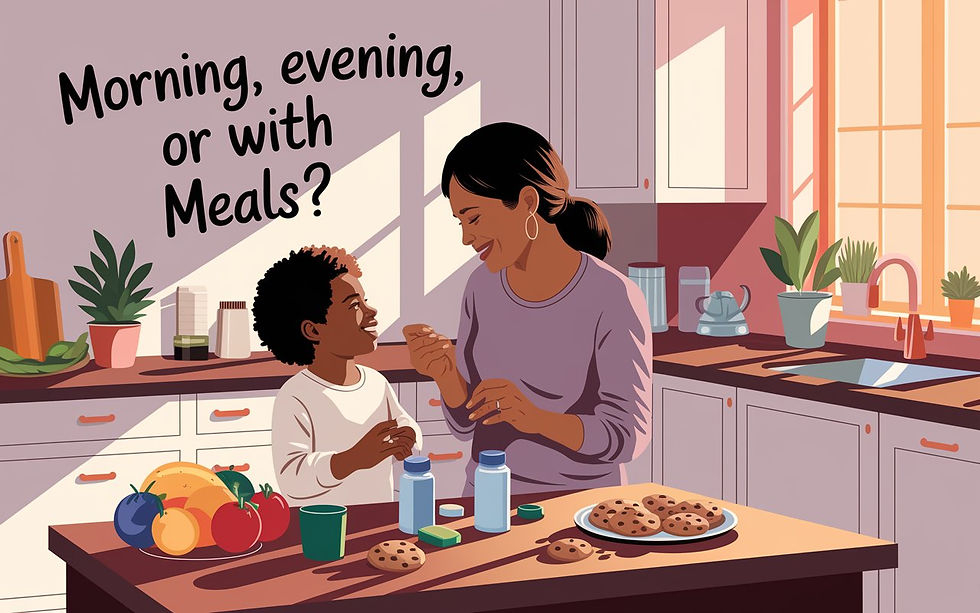Building Strong Bones Early: The Power Duo of Calcium and Vitamin D for Kids
- gumazing2
- Apr 11
- 4 min read
Every parent wants to see their child grow up strong and healthy. And while we often think of food, sleep, and outdoor play as essentials, there's one area that often gets missed — bone health.
Meet Priya, a mom of two active boys. Her youngest, Arjun, is always jumping off the couch, racing up stairs, or climbing trees. One day at a checkup, the pediatrician asked if Arjun was getting enough calcium and vitamin D. Priya hesitated — he drinks milk, but beyond that, she wasn’t sure.
Turns out, that simple question was more important than she thought.
Bones grow rapidly in childhood, especially between ages 2 to 12. And for bones to grow strong and dense, two nutrients are absolutely essential: calcium and vitamin D. They're like the bricks and cement of the skeletal system — one builds, and the other locks everything in place.

Why Calcium and Vitamin D Make a Powerful Team
Calcium is what bones are made of — it gives them strength and structure. But it doesn’t work alone. Without vitamin D, the body can’t absorb calcium properly. It’s like having bricks with no glue — even if your child eats calcium-rich food, most of it may just pass through without doing any good.
Vitamin D helps carry calcium from the food or supplements into the bloodstream and into the bones. Without enough of it, children can develop soft or weak bones, leading to conditions like rickets or delayed growth.
So, when parents ask whether their child needs calcium supplements with vitamin D, the answer often depends on their diet, sun exposure, and overall health. For picky eaters, indoor kids, or those with dairy intolerance, supplements might be a smart and simple solution.
The Daily Challenge: Are Kids Really Getting Enough?
Many parents believe their kids are covered because they drink milk or get some sun during the day. But the reality is different. A glass of milk gives some calcium, but not always enough. And vitamin D from sunlight depends on time of day, location, skin type, and even weather.
Kids who stay indoors more often (think remote learning or cold climates) are especially at risk for vitamin D deficiency.
This is why calcium supplements with vitamin D are becoming more common in households — they're easy to use, help fill dietary gaps, and give parents peace of mind that their kids are covered.
Simple Ways to Support Your Child’s Bone Health
Encourage weight-bearing activities like jumping, running, and climbing
Include calcium-rich foods like yogurt, cheese, tofu, leafy greens, and almonds
Add fortified foods like cereals and plant-based milks to their meals
Make daily supplementation a routine if recommended by your doctor
These small daily habits build up over time, helping your child form strong, dense bones that last a lifetime.
Now that we’ve passed the 200-word mark from the focus keyword, let’s gently introduce our first secondary keyword.
For broader wellness, many parents also turn to vitamins for kids that go beyond just calcium and D. These often contain additional nutrients like iron, magnesium, and B12 that support brain development, energy, and immunity. Together with strong bones, these nutrients help your child grow with strength and confidence.
What Happens If Kids Don’t Get Enough?
It might not show up right away, but signs of poor bone health can include:
Weak muscles or fatigue
Delayed walking or crawling in toddlers
Tooth decay or late teething
Fragile bones that break easily
The good news? With early nutrition and smart supplementation, these issues are largely preventable.
If your child avoids dairy, spends most of the day indoors, or has digestive issues, speak to your pediatrician. They might suggest a supplement — and if so, calcium supplements with vitamin D are often the first choice.
These supplements are typically available as chewables, liquids, or gummies, making them kid-friendly and easy to remember.
Are There Other Supplements to Support Healthy Growth?
As kids grow, their needs evolve. While calcium and D are crucial for bones, eye care gummies for kids are also becoming popular among parents who want to support vision in a screen-heavy world. These usually include nutrients like lutein and vitamin A that help with eye strain and focus, especially during school hours.
That’s why many families choose to personalize their child’s supplement routine based on lifestyle — whether it’s for bones, eyes, or immunity.

How to Pick the Right Supplement for Your Child
When shopping for supplements, keep it simple:
Look for clean labels with no artificial sweeteners or colors
Check for age-appropriate dosages
Choose trusted brands with good reviews
Talk to your doctor before starting anything new
Most importantly, stay consistent. Supplements work best when taken daily. And don’t worry if your child misses a day — just pick up where you left off.
As you build your child’s wellness foundation, you might also consider vitamin d and calcium supplements that include other important nutrients like magnesium or zinc. These extra ingredients help with muscle function, immunity, and mental focus, giving kids a more well-rounded support system.
Final Thoughts: Building Strong Bones for Life
Supporting bone health isn’t just about avoiding injuries today — it’s about setting up your child for strong, healthy aging. What they get in childhood affects their posture, mobility, and strength for years to come.
The combination of calcium supplements with vitamin D is one of the simplest and most effective ways to give your child a head start. When added to a healthy diet, active lifestyle, and daily routine, it becomes a powerful tool for long-term wellness.
FAQs: Calcium and Vitamin D for Kids
Q: At what age should my child start taking calcium and vitamin D supplements? Most pediatricians recommend supplementation around 6 months if needed, especially for breastfed babies. But always check with your doctor.
Q: Can my child get all the calcium and vitamin D they need from food? It’s possible, but many kids don’t eat enough dairy or get enough sunlight. That’s why supplements are often recommended.
Q: Are gummies better than tablets or liquids? Gummies are easier for kids to take, but it depends on your child’s preference. All forms work as long as they contain the right nutrients and dosage.
Q: Can supplements cause side effects? Not usually, if taken as directed. Stick to the recommended dose and always choose high-quality products.
Q: Can I give my child multiple supplements at once? Yes, but keep an eye on overlapping nutrients. If you're also using vitamin gummies or multivitamins, make sure you're not doubling up unnecessarily.



Comments